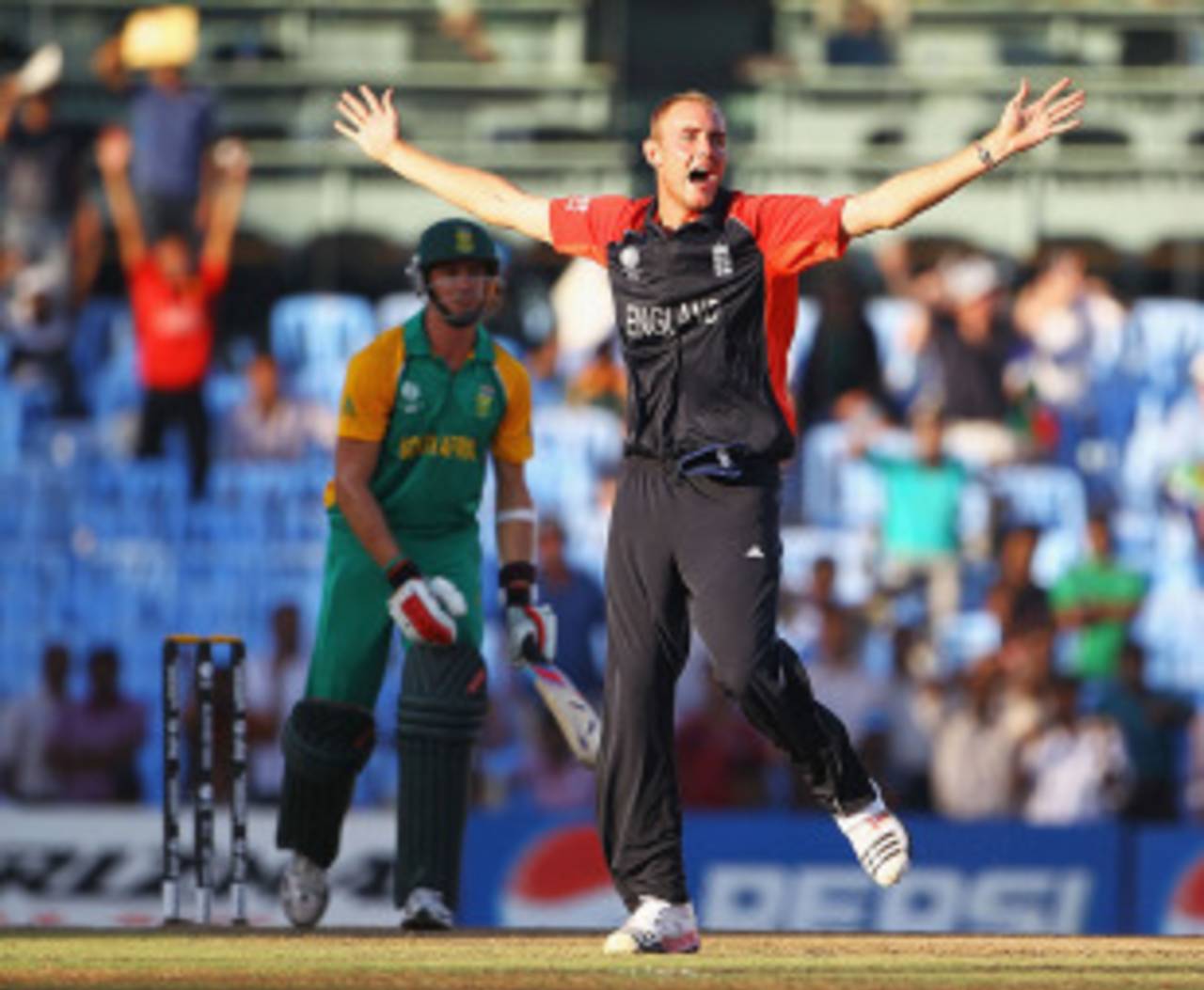Quick learner Broad faces new test
Stuart Broad has captained a team since his school days but is now set to be the man to lead England's defence of their World Twenty20 title
Andrew McGlashan
May 5, 2011, 10:14 PM

As he did with his bowling, Stuart Broad will need to learn quickly with his captaincy • Getty Images
Stuart Broad has shown throughout his career that he is a cricketer who can learn quickly but his development will need to hit a new level after being named England's Twenty20 captain. He will be the least regular of the three leaders, but his tenure could be the most fascinating.
As he sat alongside England's other two captains and the team director, Andy Flower, in the ECB offices at Lord's, he was asked about his previous experience of leading a team. He admitted he had to go back to his school days to remember the last time he captained a side. Now, a month before turning 25, he has been given a senior position in a format that demands cool heads and clear thinking.
On the horizon is a major challenge. Late next year he will lead England in the World Twenty20 as they defend their first piece of global silverware, which was secured last year in the West Indies. He won't have many chances to hone his captaincy skills before then because Twenty20 internationals are still few and far between. England have two this summer, two scheduled for the winter and a maximum of three next summer.
Unsurprisingly, it's not a challenge that worries Broad. "I don't have much experience, but it's not something that fazes me, it very much excites me," he said. "Every time I take the field I try to think like a captain, certainly looking at fields and making successions that can help.
"I've been very fortunate to play under two fantastic captains; Straussy recently but Michael Vaughan when I first came into the set-up, I learnt a huge amount under him. The key to my role will be bouncing ideas off people who have captained a huge amount and offering Alastair a lot of support in the one-day format from my experiences there."
Broad's mention of Vaughan is not surprising. There is a mutual respect there from the start of his career. Vaughan was immediately caught by Broad's maturity on his Test debut in the gruelling conditions of Galle and at the end of the 2007-08 winter called him the "smartest bowler" he had captained.
However, on June 25 at Bristol we'll get the first real indication of how the captaincy will sit with him. Twenty20 is an unforgiving format and it will only take a few overs of Tillakaratne Dilshan cutting loose for all attention to turn to Broad to see what he can come up with.
He has often been a player to wear his heart on his sleeve and be driven by emotion. In a sense they are qualities that make Broad the combative, attacking cricketer he is, and they often serve him well. Sometimes, though, he has crossed the line into petulance - most notably last summer in his confrontation with Zulqarnain Haider - and a captain must exude calmness in the tensest of situations.
"It's important I keep the same passion for the game every time I pull an England shirt on," Broad insisted. "Obviously every time you take the field as an international cricketer you want to set an example, and play in the right way. I have had the odd occasion in the past when I may have gone over the line, but I feel I've learnt a lot from that, and in a good place to take on this opportunity. Keep the same passion, and look forward to doing that."
The other situation that confronts Broad, although it will be handled largely by Andy Flower, is that the transition to his captaincy from Paul Collingwood has been the trickiest of the changes. Unlike Strauss, who decided himself that the time was right to leave one-day internationals, Collingwood still had a burning desire to defend the World Twenty20 title next year.
"He's very disappointed as you would expect him to be," Flower said. "He was a successful captain and outstanding member of the side. But this is the next generation of young England leaders behind Andrew Strauss and their development, and what they can give to England in the medium to long term is an important aspect of this decision."
Collingwood did an outstanding job as the Twenty20 captain even though he was a reluctant leader. He was willing to step back into the role in 2009, having previously handed the reins to Kevin Pietersen the year before after a difficult spell in charge of the limited-overs teams, when Strauss decided he couldn't be part of the Twenty20 unit. The emotion on his face when he scored the winning runs in Barbados spoke volumes for his desire. Despite retiring from Test cricket after the Ashes he wants to continue his limited-overs career, but the problem for Collingwood was his form.
Even in the World Twenty20 he struggled with 61 runs in the tournament and in his last 13 Twenty20 internationals his highest score is 21. Of course he brought a huge amount else to the team, yet a situation in which the captain doesn't contribute in his main role can only be sustained for so long. There is now a distinct possibility that he won't be part of Broad's Twenty20 era, but the new captain would be wise to pick his predecessor's brains.
Andrew McGlashan is an assistant editor at ESPNcricinfo